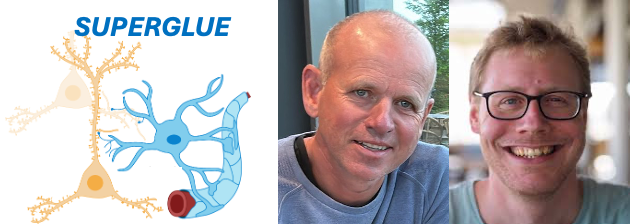
In SUPERGLUE, PI’s at the VU (Mark Verheijen, Priyanka Rao-Ruiz, Natalia Goriounova, Harold MacGillavry) and AUMC (Rogier Min, Erik Bakker, Elga de Vries) will collaborate to investigate how subcellular compartments of the astrocyte control cognitive processing .
The Dutch Research Council (NWO) has awarded a 3.1 million€ ENW-XL grant to the SUPERGLUE consortium lead by Mark Verheijen (CNCR-MCN) and Rogier Min (AUMC), together with Piyanka Rao-Ruiz (CNCR-MCN), Harold MacGillavry (CNCR-MCN), Natalia Goriounova (CNCR-INF), Erik Bakker (AUMC), and Elga de Vries (AUMC).
Research on information processing in the brain previously focused mainly on communication between neurons. However, in recent years it has emerged that a non-neuronal cell, the astrocyte, which was previously seen as a kind of support cell of your brain, also plays a role in memory and cognition. Astrocytes do this by forming connections with both neurons and blood vessels in the brain. Which molecules are involved in these connections is largely unknown. In SUPERGLUE the researchers use advanced techniques to map these molecules and cellular interactions, taking an important step in our understanding of information processing by the brain.
THE VALUE OF FUNDAMENTAL RESEARCH: The NWO-XL research consortia do share one common and essential goal: to take a big step in the direction of curiosity-driven research by consortia. The Open Competition NWO-XL is essential for the sciences as the only instrument for fundamental collaboration.
With this funding, it is up to the researchers to start, strengthen or expand groundbreaking and innovative world-class research lines together. The value of fundamental research: ‘Many of the results of fundamental research eventually end up in society. You just don’t know in advance how and when.. Without fundamental research, there is no foundation to build on.’